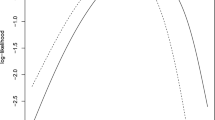Abstract
A multivariate binary distribution that incorporates the correlation between individual variables is considered. The availability of auxiliary information taking the form of simple ordering constraints on their expected values is assumed. The problem of constructing constraint-preserving estimates for expectations is formulated as conditional maximization of convex likelihood function for corresponding multinomial distribution with suitably chosen restrictions. Starting values for convex optimization algorithms are proposed. The proposed estimator is consistent under mild assumptions.
Article PDF
Similar content being viewed by others
Avoid common mistakes on your manuscript.
References
Ahuja RK, Orlin JB (2001) A fast scaling algorithm for minimizing separable convex functions subject to chain constraints. Oper Res 49: 784–789
Ayer M, Brunk HD, Ewing GM, Reid WT, Silverman E (1955) An empirical distribution function for sampling with incomplete information. Ann Math Stat 6(4): 641–647
Barlow RE, Bartholomew DJ, Bremner JM, Brunk HD (1972) Statistical inference under order restrictions. Wiley, New York
Bartoszyński R, Niewiadomska-Bugaj M (2008) Probability and statistical inference. Wiley, New York
Best MJ, Chakravarti N (1990) Active set algorithms for isotonic regression; a unifying framework. Math Program 47: 425–439
Block H, Qian S, Sampson A (1994) J Comput Graph Stat 3(3): 285–300
Boyd S, Vandenberghe L (2004) Convex optimization. Cambridge University Press, New York
Brunk HB (1955) Maximum likelihood estimates of monotone parameters. Ann Math Stat 26: 607–616
Burdakov O, Grimwall A, Hussian M (2004) A generalized PAV algorithm for monotonic regression in several variables. In: COMPSTAT proceedings in computational statistics. Physica-Verlag/Springer, Heidelberg, pp 761–767
Charras A, van Eeden C (1991) Bayes and admissibility properties of estimators in truncated parameter spaces. Can J Stat 19: 121–134
de Leeuw J, Hornik K, Mair P (2009) Isotone optimization in R: pool–adjacent–violators algorithm (PAVA) and active set methods. J Stat Softw 32(5): 1–24
Goldberger AS (1964) Econometric theory. Wiley, New York
Hansohm J (2007) Algorithms and error estimations for monotone regression on partially preordered sets. J Multivar Anal 98: 1043–1050
Hansohm J, Hu X (2012) A convergent algorithm for a generalized multivariate isotonic regression problem. Stat Papers 53(1): 107–115
Jewell NP, Kalbfleisch JD (2004) Maximum likelihood estimation of ordered multinomial probabilities. Biometrics 5(2): 291–306
Katz MW (1963) Estimating ordered probabilities. Ann Math Stat 34: 967–972
Lange K (2001) Numerical analysis for statisticians. Springer, New York
Lee CC (1983) The min–max algorithm and isotonic regression. Ann Stat 11: 467–477
Lehmann EL, Cassella G (1998) Theory of point estimation. Springer, New York
Marchand E, MacGibbon B (2000) Minimax estimation of a constrained binomial proportion. Stat Decis 18: 129–167
McKeown K, Jewell NP (2010) Miclassification of current status data. Lifetime Data Anal 16: 215–230
Nesterov Y, Nemirovski A (1994) Interior point polynomial algorithms in convex programming, studies in applied mathematics 13. SIAM, Philadelphia
Parsian A, Farsipour NS (1997) Estimation of parameters of exponential distribution in the truncated space using asymmetric loss function. Stat Papers 38: 423–443
Perron F (2003) Improving on the MLE of p for a binomial(n,p) when p is around 1/2. In: Moore M, Froda S, Leger C (eds) Mathematical statistics and applications: Fesschrift for Constance van Eeden. IMS lecture notes and monograph series, vol 43. IMS, Hayward, pp 45–61
Qian S (1992) Minimum lower sets algorithm for isotonic regression. Stat Probab Lett 15: 31–35
Robertson T, Wright FT, Dykstra RL (1988) Order restricted statistical inference. Wiley, New York
Sackrowitz H (1982) Procedures for improving the MLE for ordered binomial parameters. J Stat Plan Inference 6: 287–296
Sackrowitz H, Strawderman W (1974) On the admissibility of the M.L.E. for ordered binomial parameters. Ann Stat 2: 822–828
Sundt B (1999) An introduction to non-life insurance mathematics. VVW, Karlsruhe
van Eeden C (1956) Maximum likelihood estimation of ordered probabilities. Proc Kon Nederl Akad Wetensch Ser A 60: 128–136
van Eeden C (1957) Maximum likelihood estimation of partially or completely ordered probabilities. Proc Kon Nederl Akad Wetensch Ser A 59: 444–455
van Eeden C (1958) Testing and estimating ordered parameters of probability distributions. Ph.D. thesis, University of Amsterdam, Amsterdam
van Eeden C (2006) Restricted parameter space estimation problems: admissibility and minimaxity results. Springer, New York
Wolny-Dominiak A, Trze¸siok M (2008) Monte Carlo simulation applied to a’priori rate making, In: Proceedings of 26th international conference mathematical methods in economics 2008. Technical University of Liberec, Liberec, 17–19 Sept 2008
Acknowledgments
The work was partially supported by the Grant No NN111 558540 from the Ministry of Science and Higher Education. The author is indebted to two anonymous referees for helpful comments that led to generalization of the consistency theorem and improvement of the manuscript.
Open Access
This article is distributed under the terms of the Creative Commons Attribution License which permits any use, distribution, and reproduction in any medium, provided the original author(s) and the source are credited.
Author information
Authors and Affiliations
Corresponding author
Rights and permissions
Open Access This article is distributed under the terms of the Creative Commons Attribution 2.0 International License (https://creativecommons.org/licenses/by/2.0), which permits unrestricted use, distribution, and reproduction in any medium, provided the original work is properly cited.
About this article
Cite this article
Gamrot, W. Maximum likelihood estimation for ordered expectations of correlated binary variables. Stat Papers 54, 727–739 (2013). https://doi.org/10.1007/s00362-012-0458-x
Received:
Revised:
Published:
Issue Date:
DOI: https://doi.org/10.1007/s00362-012-0458-x



